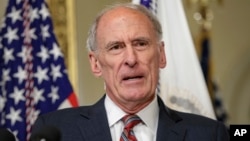Russia is not backing down in cyberspace, instead ramping up the pace of its operations against the United States, according to the nation’s top intelligence official.
“Russia has clearly assumed an ever more aggressive cyber posture by increasing cyber espionage operations, leaking data stolen from those operations,” U.S. Director of National Intelligence Dan Coats said Wednesday.
Coats did not elaborate on the scope or target of Russia’s cyber operations, but warned a range of enemies is increasingly seeking to weaponize public opinion.
“Adversaries use the internet as an echo chamber in which information, ideas or beliefs get amplified or reinforced through repetition,” Coats said at the Billington CyberSecurity Summit in Washington. “Their efforts seek to undermine our faith in our institutions or advance violence in the name of identity.”
The top intelligence official also said hackers are increasingly targeting the U.S. defense industry.
“Such intrusions even if intended for theft and espionage, could inadvertently cause serious if not catastrophic damage where an adversary looking for small scale destructive cyber action against the United Sates could miscalculate,” Coats said.
In an unclassified report released in January, the top U.S. intelligence agencies concluded Russian President Vladimir Putin waged an unprecedented “influence campaign” in an effort to sway the 2016 U.S. presidential election in favor of then-candidate Donald Trump.
As U.S. president, Trump has repeatedly questioned those assessments, suggesting at times it was unclear whether Russia was responsible.
‘As certain as gravity’
Just last week, however, an internal Facebook investigation found 470 Russian-linked accounts paid for thousands of political ads to appear during last year’s presidential election.
Facebook said further investigation also revealed another 2,200 ads "might have originated in Russia,'' including ads purchased by accounts with IP addresses in the United States but set to Russian in the language settings.”
All the accounts in question have been suspended.
Democratic lawmaker Mark Warner, vice chair of the Senate Intelligence Committee, told a security conference last week that the revelations may just be “the tip of the iceberg,” and that Russia also likely manipulated other social media platforms, such as Twitter and Google.
Despite the doubts raised by Trump and some of his supporters, former officials have remained steadfast that Russia was responsible for hacking the Democratic National Committee in an effort to discredit Democratic Party candidate Hillary Clinton.
“We personally reviewed every single piece of intelligence that went into that ICA [intelligence community assessment] and spent hours and hours talking to the analysts,” said former National Security Agency deputy director Richard Ledgett.
“I am as certain of this as I'm as certain as gravity, that the Russian government directed this activity with the intent to influence the election.”







